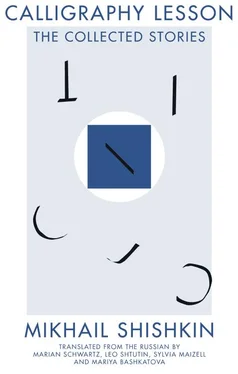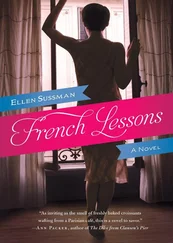Mikhail Shishkin - Calligraphy Lesson
Здесь есть возможность читать онлайн «Mikhail Shishkin - Calligraphy Lesson» весь текст электронной книги совершенно бесплатно (целиком полную версию без сокращений). В некоторых случаях можно слушать аудио, скачать через торрент в формате fb2 и присутствует краткое содержание. Город: Dallas, Год выпуска: 2015, ISBN: 2015, Издательство: Deep Vellum Publishing, Жанр: Современная проза, на английском языке. Описание произведения, (предисловие) а так же отзывы посетителей доступны на портале библиотеки ЛибКат.
- Название:Calligraphy Lesson
- Автор:
- Издательство:Deep Vellum Publishing
- Жанр:
- Год:2015
- Город:Dallas
- ISBN:978-1-941920-02-2
- Рейтинг книги:4 / 5. Голосов: 1
-
Избранное:Добавить в избранное
- Отзывы:
-
Ваша оценка:
- 80
- 1
- 2
- 3
- 4
- 5
Calligraphy Lesson: краткое содержание, описание и аннотация
Предлагаем к чтению аннотацию, описание, краткое содержание или предисловие (зависит от того, что написал сам автор книги «Calligraphy Lesson»). Если вы не нашли необходимую информацию о книге — напишите в комментариях, мы постараемся отыскать её.
Calligraphy Lesson — читать онлайн бесплатно полную книгу (весь текст) целиком
Ниже представлен текст книги, разбитый по страницам. Система сохранения места последней прочитанной страницы, позволяет с удобством читать онлайн бесплатно книгу «Calligraphy Lesson», без необходимости каждый раз заново искать на чём Вы остановились. Поставьте закладку, и сможете в любой момент перейти на страницу, на которой закончили чтение.
Интервал:
Закладка:
“The snow’s gone,” she writes in March 1907, “but instead of revolts, they’re sowing. And my heart tells me that this year there won’t be any revolution! Our program—a call for local uprisings—that’s one thing. But it seems peasant life is another story. The moment the sowing or harvest of the crop begins, the peasant loses all revolutionary zeal. Everyone, young and old, is out in the fields. All they really care about is daily survival, the here and now, not the visionary socialist republic of tomorrow.”
She began to reflect on Russian women, simple peasants, whom it was necessary to awaken to the struggle against tsarism. “I compare myself with these peasant women. They have no time to think about saving mankind, no time to worry about the people’s happiness. They have to save their own family, their children, to think about how to feed them. I want to invest all of me into trying to free them, but a doubt creeps in—what if they don’t need any part of me altogether? What sad thoughts come to me in these sleepless nights.”
In one of her next letters she talks about how the peasants confuse expropriation with looting. “They take away everything bit by bit to their homes, and the estates look like barbarians had been there. I was on such an estate—everything plundered, the pierced eyes in portraits, piles of excrement everywhere, in the most conceivable and inconceivable places. My God, how come there’s so much excrement coming from my people? I see our revolution completely differently.”
More and more she’s repelled by the brutality of events. In October of that year she writes, “They slaughtered the landowner’s entire family—two kids, a boy and a girl. Not even the doctor who was with them was spared, nor the French governess, who, by the way, came from Switzerland. I try to tell myself that that’s the way it must be, that without blood and violence there are no great revolutions. But the whole point is that I must keep convincing myself. It’s so hard for me, my beloved! People carry such hatred! And now a firing squad has come from Saratov, killing peasants from the neighboring village, not really caring who’s guilty and who isn’t. And all around the hatred is growing. And again I need to tell myself we’re living in the most wonderful, uplifting times, and that this violence will be the last.”
Her apprehension about the expropriations intensified. “If this violence floods the whole country, it will be hard to stop it. For that you need even more violence. It’s horrible!”
Lydia traveled several times to Europe during her three year stay in Saratov province. In 1908, for instance, under the pseudonym Volgina, she cast the deciding vote from the Saratov organization in the Party conference in London, even making a speech there. Each time she made a trip to Switzerland and reunited with her husband, but their meetings were becoming all too brief.
In Fritz’s diary of 1908 we read of Lydia’s visit to Zurich. “We’re growing further and further apart. Again I told her I want to finally be together, that I’m prepared to work in Russia and even study Russian. After all, the great Swiss doctor Friedrich Erismann went off to claim his wife in Moscow and started a clinic there. I’m not the first or the last. We talked again about a child. The kind of marriage we have can’t go on. Her reaction: ‘“Family happiness is not for revolutionaries.’”
The ultimate unmasking of the double agent Azef not only reverberated throughout the whole Socialist Revolutionary Party, but shook Lydia’s seemingly indestructible faith in the cause of the revolution itself. Party activity practically stopped. Former comrades began to suspect each other of provocation. For Lydia, working in such circumstances became impossible and futile.
“You can’t do something if you don’t believe you’ll succeed,” she writes in 1909 from Atkarsk to Zurich. “The Party’s falling apart. Party work has stalled. Its very heart has been pierced—everyone sees only provocation in everything, no one believes anyone. What am I doing here? There are no cultured people in Atkarsk, just philistines, and you can’t really call them people. You can only find the proletariat in the big cities. Here it’s all darkness, boredom, poverty, drunkenness, right wing nationalists, filth, in a nutshell, the Russian province, which it seems you have to either blow up or escape. It’s impossible to live here. I feel old, look terrible, my hair’s getting grey. I’m wrinkled. Life’s passing me by. In three years of daily labor I’ve not brought my dream of my country’s and my people’s great future even a jot closer, not matter how I’ve tried. Among my comrades there’s constant squabbling, mutual distrust and hatred. They hate their own more than they do strangers. I have to be an arbiter in their tedious Party trials. And I’m horrified that my love for this family, which I believed I finally found, is disappearing. I can’t believe these embittered, useless people are my family.”
She lost faith not only in her Party comrades but in the peasants. “It all boils down to the fact that they don’t need any revolution. What they’re after is the good life, dull but comfortable. To fire them up for revolution you don’t need drunken pillages, but a war. And not with Japan, but something real and big that rocks the government to its very foundations, so that trouble and hatred comes to each home, so that each peasant gets a rifle. Only then can the revolution blow up Russia. But will there be that revolution of which we dreamed, which we prepared, for whose sake we sacrificed ourselves and everyone around?”
Lydia sank into a deep depression.
“I’m still stuck here, waiting for something, but my escape from this hateful town, where nothing happens and will never happen, is long overdue. I’m like Firs who’s left behind in Chekhov’s The Cherry Orchard —everyone’s gone, but they forgot me.”
She tried again to go on with her medical practice, but couldn’t. “I have no medical books here, and not enough experience. I didn’t turn out a revolutionary or a doctor. I’m left with nothing.”
Profoundly distraught, she traveled again to Switzerland in early 1909. “Maybe, it’s not at all about the people’s happiness or revolution, maybe, I simply wanted to be happy in the one life given me and was ready to sacrifice myself for the sake of personal happiness? So then, how can we call it a ‘sacrifice’? Sometimes it seems I got all knotted up in myself, in my life—in everything. Fritz, my beloved, I’m in a bad way. Really bad. I mean emotionally. As for my body, it doesn’t matter to me anymore.”
Lydia Kochetkova went for the last time to Switzerland for treatment and again stayed at the Marbach sanatorium on Lake Boden. But the stay was brief. Flight from herself became a way of life. She couldn’t explain to Fritz her decision to return to Russia. Nor, it seems, to herself. After visiting his wife in the sanatorium, Fritz writes, “Lydia can’t possibly get back to herself after all that’s happened in the last years. She looks terrible.”
In any event, on 1 July, 1909, Lydia Petrovna Kochetkova crossed the border of the Russian empire and was arrested on the spot.
Following a brief imprisonment, she was exiled for three years to Arkhangelsk province, initially to the village of Ustvashka. In her first letters from there one can still detect a note of pride. For the Russian intellectuals, arrest, hard labor or exile traditionally served as a kind of Communion. But all too soon her tone changed.
“I have much time now to reflect on my life,” she writes in September, 1909, from Ustvashka. “Here it’s the same as all over Russia—dirt, backwardness, drunkenness, violence. The other day a neighbor stabbed his wife. Each year, in every village, someone gets killed. We worshiped the people, but they’re werewolves. Why love them? And the exiles are contentious, hostile, and hate each other. There’s not a drop of faith left in me, least of all in the revolution. Actually I feel only dread. What if the revolution really happened? We made the mess and it’s for our children and grandchildren to clean it up. Sometimes I think it’s just as well I have no child. You see, I’m not in a very good mood. My letters to you are all I can hold on to. I’m drowning.”
Читать дальшеИнтервал:
Закладка:
Похожие книги на «Calligraphy Lesson»
Представляем Вашему вниманию похожие книги на «Calligraphy Lesson» списком для выбора. Мы отобрали схожую по названию и смыслу литературу в надежде предоставить читателям больше вариантов отыскать новые, интересные, ещё непрочитанные произведения.
Обсуждение, отзывы о книге «Calligraphy Lesson» и просто собственные мнения читателей. Оставьте ваши комментарии, напишите, что Вы думаете о произведении, его смысле или главных героях. Укажите что конкретно понравилось, а что нет, и почему Вы так считаете.












